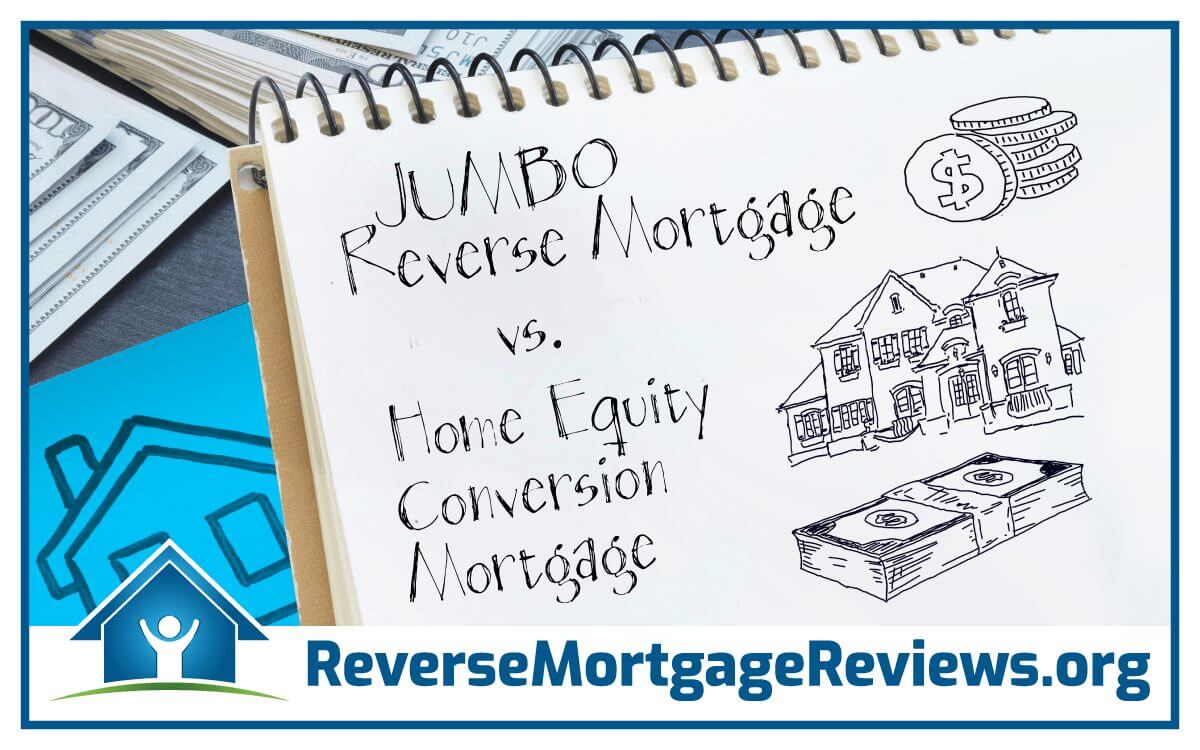What is a Jumbo Reverse Mortgage?
Mike Branson Jr. – Author
Mike Branson Jr. has 25 years of experience in the mortgage banking industry. He has devoted the past 19 years to reverse mortgages exclusively. Mike has worked in several aspects of the Mortgage industry, including Loan Origination, Underwriting, and Management.A reverse mortgage is an increasingly well-known loan type that allows age-qualified senior borrowers to access their home equity while still living in the home. However, many prospective borrowers may not be as familiar with the different loan programs available, specifically the differences between a Home Equity Conversion Mortgage (HECM) and a jumbo reverse mortgage.
In this article , you will learn:
- The differences between a jumbo reverse mortgage and a HECM
- Scenarios when it may make sense to consider a jumbo reverse mortgage
- Where to find a jumbo reverse mortgage lender
- Where to learn more
What is a jumbo reverse mortgage?

A jumbo reverse mortgage is similar to a jumbo forward mortgage in the sense that it is a mortgage that enables the borrower to borrow more than a conventional or conforming loan will allow. In the case of loans insured by the Federal Housing Administration (FHA) and made available by programs through the Department of Housing and Urban Development, lending limits are in place, which means borrowers will be limited in the amount they can borrow and access.
HECMs comprise the vast majority of reverse mortgages. The FHA insures these loans, requiring the borrower to pay mortgage insurance premiums as a result. Under the HECM program, borrowers are subject to Home Equity Conversion Mortgage program rules and enjoy borrower protections under the program.
HECM Reverse Mortgage Limits
Among those rules, the reverse mortgage lending limit for HECM loans currently is $1,149,825. Jumbo reverse mortgages are those reverse mortgage products that allow for greater borrowing power, sometimes extending up to home values as high as several million dollars.
Because jumbo and other private reverse mortgages are proprietary and are not subject to HECM rules, they may also give access to specific borrowers who would not otherwise qualify for a reverse mortgage, such as condo owners and borrowers younger than 62.
However, most programs mirror the HECM reverse mortgage in many ways; most private reverse mortgages require reverse mortgage counseling, for example, a term of HECM loans. The basic requirements of a jumbo reverse mortgage are the same as with an HECM loan, including that the borrower must own their home, maintain it as a primary residence, and meet a minimum age requirement. Reverse mortgage borrowers under all programs must continue to pay property taxes and homeowners insurance throughout the loan.
Scenarios when it may make sense to consider a jumbo or private reverse mortgage
A reverse mortgage calculator is an excellent tool to help determine roughly how much can be borrowed with a reverse mortgage ? whether it is a HECM or a jumbo loan. A loan originator can help review calculations and provide insight into the costs associated with each loan type, the available programs, and the rates offered under each program.
There are several scenarios where it may make sense for a borrower to explore jumbo reverse mortgage or private reverse mortgage options:
- ISupposethe borrower has a home value well over the FHA’s lending limit of $1,089,300. According to Zillow’s home price index compiling data as of September 2022, California’s average single-family home value was $769,405 ? an increase of 8.7% year over year. Many homes in California are valued well over this average, making California borrowers one of the critical markets for jumbo reverse mortgages.
- If the borrower has a home type that is not allowed by the HECM program, such as a condominium or a unit that is part of a homeowners’ association that does not carry FHA approval.
- If the borrower otherwise does not qualify for a HECM due to being slightly younger than the HECM program allows, a private or jumbo program may be available to serve that borrower.
Most commonly, however, borrowers seek a jumbo reverse mortgage because they would leave home equity on the table by utilizing the FHA’s program. For borrowers with high-valued homes that have enjoyed equity growth over time, jumbo reverse mortgages can often allow them to access more equity than under a HECM reverse mortgage.
Where to find a jumbo reverse mortgage lender
Several lenders offer jumbo or proprietary reverse mortgages, and the various programs offer different loan benefits and terms. A trusted originator, such as one you will find on our top 10 lenders list, may be able to provide access to more than one of these loan programs. Additionally, it will benefit the borrower to explore the different programs available to compare these costs and benefits.
Where to learn more
HUD maintains online resources about the HECM reverse mortgage program at https://www.hud.gov/program_offices/housing/sfh/hecm/hecmhome. Prospective borrowers may also learn more by visiting the Jumbo Reverse Mortgage Guide at https://www.investopedia.com/jumbo-reverse-mortgage-5222279
|
No Comments on “What is a Jumbo Reverse Mortgage?”
|

